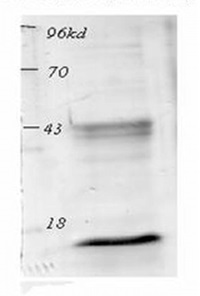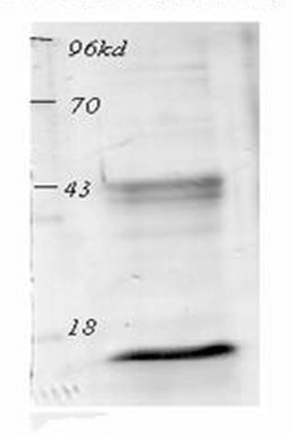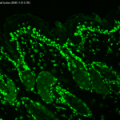1

Anti-Acetylated Lysine (polyclonal)
AS15 3018 | Clonality: Polyclonal | Host: Rabbit | Reactivity: Acetylated Lysine
- Product Info
-
Immunogen: chemically modified KLH allowing acetylation of all lysines of this carrier protein
Host: Rabbit Clonality: Polyclonal Purity: Total immunoglobulin. Protein A purified in PBS, 50% glycerol, 0.09% sodium azide. Format: Liquid Quantity: 100 µg (1 mg/ml) Storage: Store at -20°C for 1 year; make aliquots to avoid repeated freeze-thaw cycles. Tested applications: ELISA (ELISA), Immunohistochemistry (ICC), Immunofluorescence (IF), Immunoprecipitation (IP), Western blot (WB) Recommended dilution: 1 : 100 (ICC/IF), 1 : 250 (WB) - Reactivity
-
Confirmed reactivity: Detects proteins containing acetylated lysine residues in all specias, No reaction to non-acetylated proteins - Application Examples
-

>Western blot analysis of mouse spleen lysates showing detection of acetylated lysine protein using rabbit anti-acetylated lysine polyclonal antibody used at a dilution of 1:1000.

Immunocytochemistry/Immunofluorescence analysis using rabbit anti-acetylated lysine polyclonal antibody.
Tissue: heat shocked cervical cancer cell line (HeLa).
Species: human.
Fixation: 2% formaldehyde for 20 min at RT.
Primary antibody: rabbit anti-acetylated lysine polyclonal antibody at a dilution 1:100 for 12 hours at 4°C.
Secondary antibody: R-PE goat anti-rabbit (yellow) at 1:200 for 2 hours at RT. Counterstain: DAPI (blue) nuclear stain at 1:40 000 for 2 hours at RT. Localization: Nucleus. Cytoplasm.
Magnification: 100x.
Figures: (A) DAPI (blue) nuclear stain. (B) Anti-acetylated lysine antibody. (C) Composite. heat shocked at 42°C for 1h. - Additional Information
-
Additional information: Protein A purified antibodies are present in PBS with 0,09 % sodium azide as preservative and 50 % glycerol, - Background
-
Background: Acetylated Lysine is involved in post-translational modifications of proteins which play a critical role in the regulation and function of many known biological processes. Proteins can be post-translationally modified in many different ways, and a common post-transcriptional modification of lysine involves acetylation.
- Reviews:
-
This product doesn't have any reviews.



